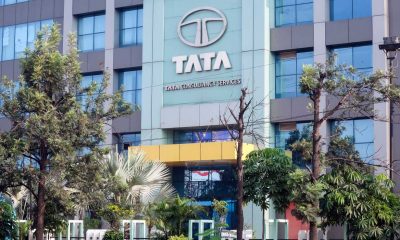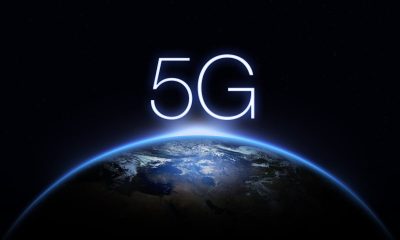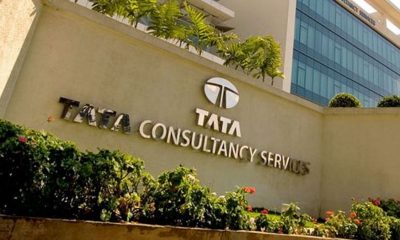News
TCS net income jumps 10.8% to Rs 8,131 crore
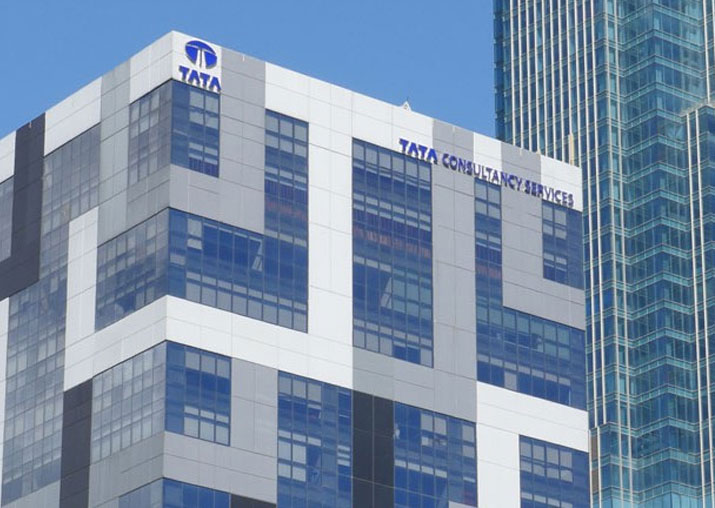
NEW DELHI: Largest software exporter TCS on Tuesday reported a 10.8 percent rise in June quarter net at Rs 8,131 crore and said focus will be on maintaining double-digit revenue growth in the rest of the year.
The Tata Group cash machine reported a revenue growth of 11.4 percent to Rs 38,172 crore during the quarter, which on a constant currency basis clipped at 10.6 percent.
Bottomline has been hit a tad due to currency appreciation, and Tata Consultancy Services (TCS) said without quantifying it and termed currency depreciation as “intrinsic” to its business model and pointed out that future currency movements will determine if it can get the operating profit margin in the aspirational band of 26-28 percent.
Managing director and chief executive Rajesh Gopinathan said in FY18 revenue growth had slipped to below 10 percent, which recovered to double-digits in FY19 and said he is not looking at faster pace of topline growth.
“I am really not looking for acceleration, but looking for sustaining the double-digit growth level going forward,” he told reporters announcing the numbers.
It can be recalled that the industry lobby Nasscom has stopped the practice of announcing yearly growth targets for the industry. The industry grew at 9 percent in FY19. TCS is the first company to announce the June quarter earnings.
He said the deal momentum is good and it was able to close the quarter with USD 5 billion worth of new deals, which include four clients in the USD 100 million-plus bracket.
From a profitability perspective, operating margin came in at 24.2 percent for the reporting quarter impacted by rupee gains and the higher wage bills.
Chief financial officer V Ramakrishnan, without offering a break-up, said there was a 2.4 percentage point impact from currency appreciation and the impact of the annual wage hikes granted to its 4.36 lakh employees, while operating efficiencies cushioned the overall impact at 0.88 percent compared to the preceding quarter. But he
Whether it will be able to meet its aspiration of getting the margin into the 26-28 percent bracket, he said currency can be the “spoiler”.
“We’ve always said some amount of currency depreciation is intrinsic to our business. We have seen a lot of currency appreciation off late, so that can be a spoiler,” he said.
From a segmental perspective, Gopinathan said there is softness in the capital markets segment, especially across continental Europe. The comments come two days after German financial powerhouse Deutsche Bank announced a shuttering its equity business globally.
But he said banking, finance and insurance segment revenue grew 9.2 percent on an annualised basis, while it was able to increase the same from life sciences by 18 percent.
Revenue from the fast growing digital stream clipped past 42 percent to command one-third of its total revenue flow with a 32.2 percent share, he said, adding over 3.15 lakh employees have already been trained on digital technologies.
Gopinathan said manufacturing is a mixed bag with companies– in its largest market of the US– doing well, while Europe and Britain are a drag on the overall growth. On retail, he said it was a one-off quarter with setbacks like early closure by clients like Sears.
On the budget proposals, especially those on taxing share buybacks, which is a popular option of returning excess cash adopted by IT companies in the past few years to shareholders, Gopinathan said the capital allocation policy continues but the “route and mechanism” of returning the cash will be looked at later.
He did not directly comment on the proposal to cap promoter holding at 65 percent, but made it clear that TCS will not go for reduction in the holding by issuing new shares. The Tata Group owns 75 percent in TCS, which contributes around 85 percent of the group profit.
Newly-appointed human resources head Milind Lakkad asserted that they are the biggest job creator among Indian companies in the US, and said while H1-B visa concerns are real, they are not a constraint.
The company added 12,000 employees on a net basis during the quarter, which is the highest in five years, and Gopinathan said more will be added in the quarters ahead from the 30,000 offers made to freshers.
The attrition level went up by a notch to 11.5 percent during the quarter, which Lakkad attributed to seasonal factors like implementation of wage hikes.
The company said it has applied for 86 patents during the quarter, taking the overall patents applications to 4,682 as of end June 2019, and has been granted 1,022 patents.
Sanjoy Sen, a senior research fellow on strategy and governance at Britain’s Loughborough University said TCS has exceeded market expectations with the numbers amid the uncertain macro environment.
“Whatever success achieved is clearly down to TCS’ successful implementation of strategy and operational performance,” he said in a statement.
Ahead of the earnings announcement in the evening, the TCS counter closed 2.05 percent down at Rs 2,131.45 on the BSE which closed flat.
Source: Press Trust of India
News
Yotta’s Cloud Data Center in GIFT City, Gujarat goes live
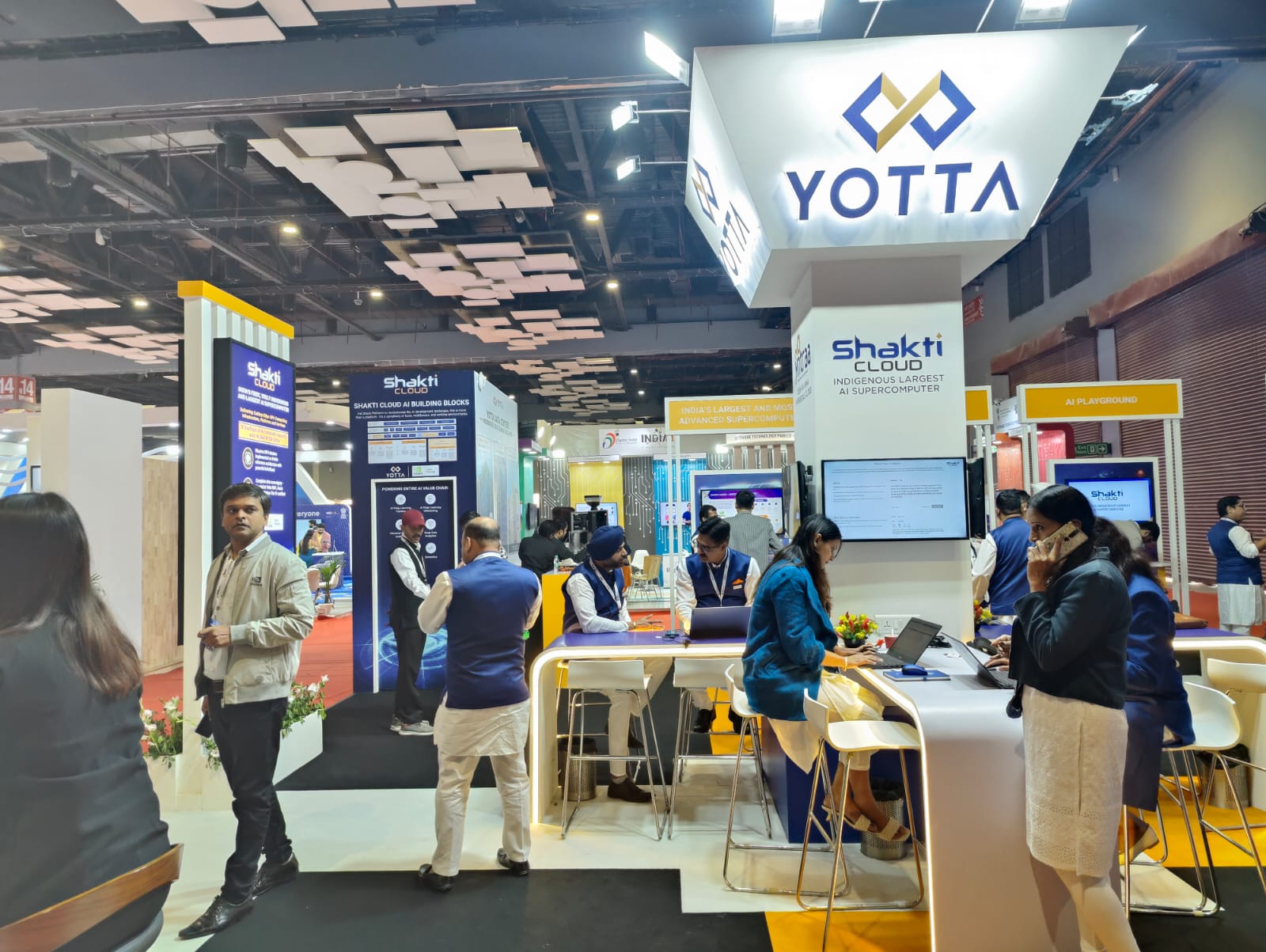
NEW DELHI: Yotta Data Services, an end-to-end Digital Transformation service provider, has announced that its state-of-the-art data centre facility, “Yotta G1”, located in GIFT city, Gandhinagar is ready for service (RFS).
The opening of this data center marks the debut of Yotta in Gujarat and progresses the company’s mission to provide digital services in India’s high-growth markets.
G1 is Yotta’s fifth data center facility in the country. It joins four large operational data centers, two of which, at Navi Mumbai and Greater Noida are part of hyperscale campuses. Yotta G1 is uniquely located inside the International Financial Services Center (IFSC) zone of Gandhinagar’s Gujarat International Finance Tec-City (GIFT city).
G1 represents an investment of more than INR 500 cr. over five years across critical non-IT and IT / Cloud / AI compute infrastructure. The data center has a capacity of over 350 high-density racks and 2 MW power (which can be scaled further as per demand). The facility is designed to meet the most demanding digital needs of its customers, who may be located within GIFT City or anywhere in the world, by seamlessly delivering fault-tolerant facility infrastructure, high-performance Cloud compute and storage infrastructure, advanced physical and cyber security, unmatched connectivity, and steadfast sustainability.
For large global enterprises operating in the GIFT City IFSC zone, the G1 data center functions as a potential data embassy, whereby their data stored is subject to the laws and regulations of their home country, thus allowing them to maintain sovereignty over their data, even when stored in India. By storing data in a physically different location, global enterprises can ensure continuity of operations in case of major disruptions within their borders. The data center’s location also ensures compliance with the IFSC regulations, providing businesses in the zone with distinct advantages like free foreign exchange convertibility, a liberalised regulatory environment, and business-friendly policies. It also helps enterprises adhere to IFSC’s compliance requirements, including being mandated to host their data within the IFSC zone.
Commenting on the announcement, Darshan Hiranandani, Co-founder and Chairman, Yotta Data Services, said, “The state of Gujarat, with GIFT City, has been at the forefront of providing a viable and sustainable platform for global businesses to set up base in India. The setting up of the IFSC zone is a further testament to their vision for financial services companies. We are proud to support this vision of the Gujarat government with a state-of-the-art data center within the IFSC zone, providing the latest and best in cutting-edge technologies to help businesses set up and scale their businesses while also adhering to all regulatory requirements.”
Adding to this, Sunil Gupta, Co-Founder, MD & CEO, Yotta Data Services, said, “Yotta’s G1 marks a pivotal milestone in delivering high-end data center, Cloud, AI compute, storage, connectivity and cybersecurity services to enterprises both on a global and local scale in the Gujarat region. Besides serving the domestic enterprises within and outside GIFT City, our data center shall serve as a potential data embassy for global enterprises, enabling them to adhere to their respective country’s laws while offering a dependable and secure locale for offshore data storage.”
G1 data centre stands distinct in GIFT city for being a data center offering more than just colocation services. True to Yotta’s stature as the end-to-end digital transformation partner of choice for enterprises, G1 brings forth a suite of key features, ranging from advanced data security and customised business solutions to an indigenous hyperscale cloud offering, AI-GPU compute offering, state-of-the-art infrastructure, cybersecurity expertise, seamless integration with managed IT services, 24/7 customer support, cost optimisation, and an overall competitive edge.
This announcement follows on the heels of Yotta’s recent launch of its cloud services – Shakti Cloud and Yntraa Cloud. Powered by NVIDIA’s top-of-the-line GPUs, Shakti Cloud is India’s largest & fastest AI-HPC supercomputer, delivering cutting-edge GPU computing infrastructure, platforms, and services, including Infrastructure as a Service, Platform as a Service, and Software as a Service. Yntraa Cloud, on the other hand, is a truly indigenous hyperscale cloud platform at par with global cloud platforms, offering an exhaustive range of cloud products and services.
News
Optiemus Infracom joins hands with Corning International

NEW DELHI: Domestic contract manufacturer Optiemus Infracom has entered into a joint venture with US-based speciality glassmaker Corning International to set up India’s first manufacturing facility for producing high-quality finished cover glass parts for the mobile consumer electronics industry.
The collaboration between both the companies will help expand India’s electronics manufacturing ecosystem, as the Indian government strengthens its Make in India initiative. As a part of the joint venture, the companies strategically aim to set up a world-class manufacturing facility in India, powered by cutting-edge technologies and processes.
Driven by a shared commitment to innovation and technological excellence, this collaboration will pave the way for the manufacturing of “Made in India” finished cover glass parts for use in mobile consumer electronic devices, and other cover glass applications, to meet the needs of next-generation mobile consumer electronic devices.
The joint venture signifies a powerful synergy between Optiemus’s deep domestic industry and manufacturing knowledge of electronics and telecom market and Corning’s globally-acclaimed expertise in advanced glass technology. By combining these strengths, the joint venture aspires to not only establish cover glass manufacturing capabilities and capacity in India, but also to contribute significantly to the creation of jobs and skill development within India’s thriving technology sector, the companies said in a statement.
Ashok Kumar Gupta, Chairman, Optiemus Infracom, said, “It is a matter of great pride for us to actively contribute to the growing manufacturing ecosystem in the country. With this joint venture, initiated in line with the vision of Hon’ble Prime Minister of India of ‘Make in India’ programme and the “Atmanirbhar Bharat” initiative, we are committed to make available world-class high-quality products for global and local brands.”
“Embarking on this new journey, we intend to emerge as one of the top manufacturers of finished cover glass parts for use in mobile consumer electronic devices in the next five years. Our collective expertise in innovation, design, and manufacturing, will provide holistic solutions for the brands,” Gupta added.
5g
MediaTek Catch-up with Tech: Infinix Zero 30 5G with Dimensity 8020 launched

NEW DELHI: Chipset maker MediaTek, which claims to power more than two billion connected devices every year, hosted ‘Catch-up with Tech’ in collaboration with handset brand Infinix on August 28 to share insightful and engaging conversations about the new-age smartphones and innovative technologies powering everyday lives.
The meet-up threw the spotlight on the MediaTek Dimensity Auto, Satellite solutions and Generative AI along with an extensive showcase of newly-launched Infinix Zero 30 5G powered by MediaTek Dimensity 8020, Infinix GT 10 Pro powered by MediaTek Dimensity 8050, and Infinix QLED TV powered by MediaTek.
In terms of specs, the Infinix Zero 30 5G is tailored for young storytellers and creators, featuring the first-ever smartphone to deliver 4K 60fps video recording from its 108 MP OIS rear camera and ultra-high resolution 50MP front camera. The Zero 30 series powered by MediaTek Dimensity 8020 is said to be a game changer for the front camera vlogging experience along with being the slimmest curved AMOLED smartphone in the segment with glass and a vegan leather back panel. It also claims to be one of the most premium-looking devices in the segment.
The event witnessed a panel discussion moderated by Anuj Sidharth, Deputy Director Marketing & Corporate Communications, MediaTek and included expert panelists from Infinix, MediaTek and two renowned professional photographers.
“With the fifth edition of Catch-up with Tech, we aim to bring consumers closer to the technology and enable them to make informed buying decisions based on their diverse needs. In collaboration with Infinix, this meet-up is in-line with MediaTek’s vision of technology democratization and making innovative technology accessible to everyone,” said Anku Jain, Managing Director, MediaTek India. “The MediaTek Dimensity 8020 in Infinix Zero 30 5G brings faster displays, brilliant cameras and ultra-fast performance. Further, MediaTek Imagiq technologies enrich the capture experience by combining dedicated AI, imaging processors and accelerators to provide incredible results,” he added.
Anish Kapoor, CEO, Infinix Mobile India, said, “Featuring India’s first 50MP 4K 60 fps video recording, Infinix Zero 30 5G is primed to redefine smartphone imaging capabilities, setting a new standard for the creators and vlogging enthusiasts. Our collaboration with MediaTek has played a pivotal role in shaping our exceptional smartphone portfolio, and the Zero 30 5G stands as evidence of our unwavering commitment to innovation and delivering unmatched experiences to our users. The display and design of the device represent a leap forward in smartphone technology. As Infinix Zero 30 5G hits the shelves, we are positive that our customers will find this new offering as exhilarating as we do, further empowering creators to capture their story like never before.”
Radhakrishnan Chakyat, a photography evangelist, founder and host of Pixel Viilage, said, “Infinix Zero 30 5G smartphone powered by MediaTek Dimensity 8020 chipset has amazing hardware features, an excellent camera, dual-view video mode and is primed for optimal content creation and saves a tremendous amount of editing time.”
Aarzoo Khurana, a wildlife photographer, said, “Over the last few days, I clicked various pictures and recorded a few videos with the newly-launched Infinix Zero 30 5G powered by MediaTek Dimensity 8020, and the experience has been truly inspiring. Infinix’s smartphone’s OIS feature helps content creators click shake-free pictures and the front camera, which is extremely sharp and detailed, enables content creators to click countless selfies.”



